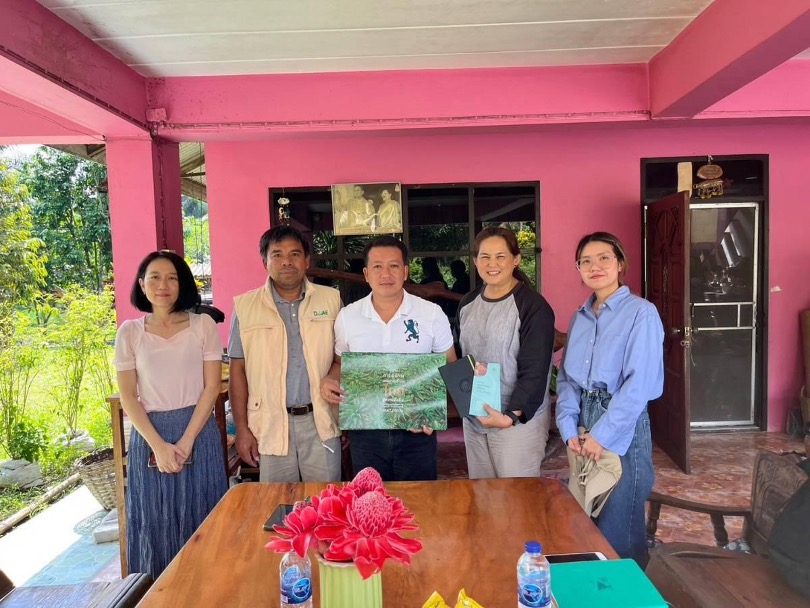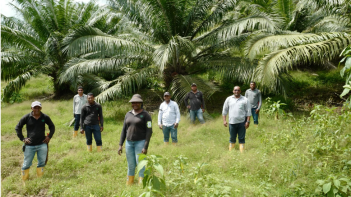
Human-elephant conflict remains one of the prevalent issues impacting Thailand’s oil palm plantations. This conflict arises when the land used for oil palm cultivation encroaches on the natural habitats of wildlife – the loss of habitat forces elephants to breach plantations in search of food and water, which can lead them to trample or consume oil palm crops.
Elephant-human conflict cases exist in Thailand’s Khao Ang Le Nai Wildlife Sanctuary forest complex. Apart from elephants, an overpopulation of gaurs (Indian bison) have emerged in Khao Yai at the Khao Paeng Ma Non-Hunting Area restoration site.
In recent years, wild elephants have likewise found their way to village plantations bordering Thailand’s Kaeng Krung National Park. One male elephant was reported to have reached the local school about 2km from the national park’s border. Similarly, in an area close to the Khao Sok National Park, a herd of elephants had been grazing on young oil palm trees throughout the year. Such incursions of wildlife potentially raise safety concerns and tensions among the local communities over the loss of their crops and sources of livelihood.
Gaining a deeper understanding of wildlife conflict was a highlight of the RSPO Thailand team’s Walk & Talk visit in January to the Khao Sok-Khlong Seang Forest Complex in Tha Chana District, Surat Thani province. The visit followed the team’s meeting with the Surat Thani Governor, Mr. Jetsada Chitrat, alongside the Tha Chana District Officer and the Surat Thani Farmers’ Association. Tha Chana District is one of the pilot districts of the ongoing initiative to boost Surat Thani as the National Model City for Sustainable Palm Oil, in which hundreds of smallholders have adopted sustainable agricultural practices towards RSPO Certification. The Surat Thani Sustainable Palm Oil Landscape Programme’s target area is set to increase from 2 to 17 districts, covering the whole palm oil plantation area in the province.
Harmony with wildlife

One of the aims of the landscape programme is to resolve wildlife conflict, helping farmers to live in harmony with elephants and gaurs in the palm oil plantation areas.
“The elephant-human conflict is a challenging matter that gave us insight into the critical cross-issues affecting land tenure along the Khao Sok-Khlong Seang Forest Complex,” shared Radda Larpnun, RSPO Technical Manager, Thailand.
Asian elephants (Elephas maximus) are included in the International Union for Conservation of Nature (IUCN) Red List of Threatened Species in 2019, which is part of the scope of the High Conservation (HCV) focused on biodiversity, species, ecosystems and landscapes.
“The RSPO requires growers to identify, maintain and enhance HCVs identified in their operations. As plantations expand, the biodiversity-rich Khao Sok-Khlong Seang Forest Complex continues to face threats to its rich biodiversity,” added Radda.
To help prevent elephant incursions into their farms, smallholders have applied local wisdom by using wooden fences attached to cow dung in bags. Other solutions include placing artificial salt licks in the forest, forest restoration, and prohibiting fruit planting near the forest, which attracts foraging elephants.
Thai smallholders’ role in sustainable future
Thailand is the third biggest producer of palm oil in the world, behind Indonesia and Malaysia. With Thai smallholders playing a central role in the country’s sustainable palm oil future, empowering and enabling smallholders to better manage the delicate balance between humans and wildlife will be critical to improving their wellbeing and long-term livelihoods.
“We still have a long way to go, but we believe that with a strong collaboration with the Surat Thani province government, we can see the bright light at the end of the tunnel,” added Radda.
Keep reading

Access into prisma

Updated Trace Function in prisma

Call for Expression of Interest: Independent Investigation of a Complaint

Latin American Smallholders, Key Global Brands Gather in Peruvian Amazon to Advance Sustainable Palm Oil

RSPO Forum for Members and Certification Bodies 2025: Strengthening Capacities and Building Bridges with RSPO Members

From Violence to Prosperity: Cultivating Sustainable Palm Oil in San Pablo, Colombia

Palmas de Tumaco: Enduring, Trusting, and Transforming in Colombia’s Pacific Coast
Carry Over Credits for Certified Independent Smallholder Groups




